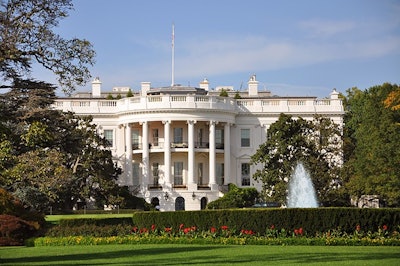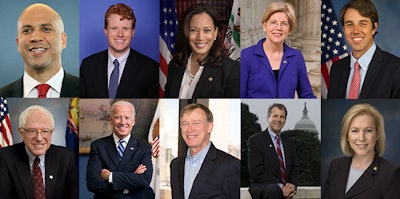
Editor's note: We'll continue to update this page as Democratic presidential candidates formally announce their campaigns and provide greater insight into their cannabis stances. Last updated Feb. 27, 2020.
There’s no doubt that cannabis will play a major role in the 2020 elections, and it’s almost certain to be a sticking point in any presidential debate—especially as a litmus test in the Democratic primaries.
President Donald Trump has gone back and forth on the matter, but has mostly just stayed out of it. His former attorney general, Jeff Sessions, was a notorious prohibitionist who repealed the Cole Memo in January 2018, and Trump’s White House has developed a mysterious interagency called the Marijuana Policy Coordination Committee. No one is very clear on what that means, but BuzzFeed reporter Dominic Holden has described it as a “secret war on weed,” citing independent quotes from departments involved it the work.
Can Trump reschedule, decriminalize or legalize cannabis on a federal level before the 2020 elections? Sure, but it’s complicated. And he may very well do one of the above.
For the growing field of Democratic challengers, though, it’s a race to establish firm footing in the rapidly growing cannabis constituency.
We've been tracking Democratic candidates' cannabis stances throughout the year. Now, with the Dec. 19 Democratic debate looming, we've got an updated overview of policy positions.

We've cycled through quite a few Democratic candidates during this 2020 campaign. Based on recent debate performances, only seven candidates remain: Joe Biden, Michael Bloomberg, Pete Buttigieg, Amy Klobuchar, Bernie Sanders, Tom Steyer and Elizabeth Warren.
Let’s have a look at where possible contenders stand on cannabis.
Joe Biden
Former Vice President Joe Biden has openly regretted not running for president in 2016. During his time in the White House, Biden and former President Barack Obama leaned away from legalization as a political solution. They and their U.S. Department of Justice officials, however, did support a greater degree of discretion in law enforcement. The 2013 Cole Memo was enacted under their administration. In 2014, Biden told TIME, “I think the idea of focusing significant resources on interdicting or convicting people for smoking marijuana is a waste of our resources. That's different than [legalization]. Our policy for our Administration is still not legalization, and that is [and] continues to be our policy."
Of course, it was under the Obama/Biden administration that Colorado and Washington kicked off the national shift to adult-use cannabis markets. While Biden, as vice president, didn’t contribute to the political evolution on this issue, his time at the helm of a more liberal society (generally speaking) may provide helpful guidance on how amendable he could be to cannabis reform in the future.
Biden has used the phrase "gateway drug" in conversations about cannabis, but he does support decriminalization. He also supports federal legalization of medical cannabis. See his latest cannabis policy stances here. (In New Hampshire, according to audio obtained by Politico, he confronted the topic a bit more directly: "I think it is at the point where it has to be, basically, legalized.")
Elizabeth Warren
U.S. Sen. Elizabeth Warren (D-MA) has supported cannabis reform efforts by introducing and cosponsoring legislation to end federal prohibition. On June 7, she introduced the STATES Act with Sen. Cory Gardner to echo Cole Memo policy and exempt state-legal regulated marijuana markets from the CSA. On the same day, Warren also co-sponsored the Marijuana Justice Act, which was introduced by Sen. Cory Booker to essentially legalize cannabis at the federal level, removing it from the CSA entirely. Warren also co-sponsored a decriminalization bill introduced by Sen. Chuck Schumer earlier this year that would remove cannabis from the CSA and let states regulate it.
Warren received a B grade on NORML’s 2016 Massachusetts scorecard, and the NORML Political Action Committee (NORML PAC) endorsed Warren in the November 2018 election.
In late February, Warren released a more formal plan to legalize cannabis as president: removing cannabis from the list of controlled substances and expunging past federal convictions relating to the plant.
Bernie Sanders
U.S. Sen. Bernie Sanders (D-VT) joined Booker in a Facebook Live video earlier this year to extol the virtues of cannabis reform in a democratic society and to voice support as a co-sponsor of the Marijuana Justice Act. At a rally for U.S. Rep. Barbara Lee last fall, he said, "God only knows how many hundreds of thousands of lives have been ruined by people who receive police records for the possession of marijuana. And I am very proud that in my state of Vermont and here in California, we're making progress by legalizing possession of marijuana and in other parts decriminalizing it."
In 2016, he received a “B” from NORML. Sanders, of course, ran for president in 2016 and cultivated a popular primary campaign. NORML then endorsed Sanders in his 2018 Senate reelection, and gave him an "A+" grade.
In recent debate appearances, Sanders has openly targeted the criminal justice system and the decades-long war on drugs that decimated communities around the U.S. He advocated for small business development in what would be a federally legal cannabis industry. "We have a criminal justice system today that is not only broken, it is racist," he said in the South Carolina debate.
Nearly 7 in 10 Americans—and a majority of both Republicans and Democrats—support marijuana legalization.
— Bernie Sanders (@BernieSanders) April 19, 2019
The American people agree. It is time our federal government listens. We must end the criminalization of marijuana in this country.
Pete Buttigieg
The mayor of South Bend, Ind., has not yet had the opportunity to oversee a cannabis market (medical or otherwise), though he supports reform efforts. “The safe, regulated and legal sale of marijuana is an idea whose time has come for the United States,” he told the Boston Globe.
Like Biden and Bloomberg, Buttigieg has leaned on the decriminalization aspect of cannabis reform, not full-on legalization. “No, what I’ve called for is that incarceration should no longer be the response to drug possession. What I’m calling for is that we end the use of incarceration as a response,” he said in New Hampshire. “This does not mean that it will be lawful to produce or distribute those kinds of harmful drugs, but also, as we know from the opioid crisis, some of this has been driven by companies that were acting irresponsibly with substances that were lawful.”
Amy Klobuchar
U.S. Sen. Amy Klobuchar of Minnesota has not taken a particularly vocal stance on the cannabis legalization issue. She has stated, however, tacitly, that she supports it.
“I support the legalization of marijuana and believe that states should have the right to determine the best approach to marijuana within their borders," she told the Washington Post earlier this year. She has walked cautiously around any specific plan to do so, however, instead explaining that it's a longer-term discussion that requires the input of many stakeholders in Washington and across the country.
According to NORML, Klobuchar "held a D rating from marijuana advocacy organization NORML, indicating a 'hard on drugs stance,' while serving as a prosecutor in her home state, but she was later upgraded to a B while serving in the U.S. Senate."
Michael Bloomberg
While New York Gov. Andrew Cuomo proposed adult-use cannabis legalization as part of his state budget on Jan. 16, former New York City mayor and possible presidential candidate Michael Bloomberg disapproves, saying that attempting to legalize recreational marijuana "is perhaps the stupidest thing anybody has ever done," as first reported by WBNG.
Industry stakeholders are fighting back.
"The antiquated drug enforcement policies Michael Bloomberg implemented as mayor proved to be disastrous and racially discriminatory," said Evan Nison, a NORML board member. "Unfortunately, it’s no surprise he would want to continue the failed policy of cannabis prohibition as well. The positive I see in him making this comment is it helping assure he’ll be un-electable by my generation."
“Considering that most recent polls show at least 70 percent of democrats support legalizing marijuana, it’s perplexing that Bloomberg would choose such an aggressively anti-marijuana stance so early in the electoral season," added Sam D'Arcangelo, director of the Cannabis Voter Project. "I can’t imagine what he thinks he has to gain by staking out that kind of position."
Bloomberg does support decriminalization measures.
Tom Steyer
The other billionaire Democrat in this race, Tom Steyer, has not been vocal about his support for cannabis legalization. Rather, in a recent interview with the Las Vegas Sun, Steyer couched his remarks in a question of banking reform.
"I’m for legalizing marijuana," he said. "I’m from California, we also have legalized marijuana. As long as there is federal deposit insurance and it is illegal according to federal law to sell either medical or recreational marijuana, it’s impossible for a bank to finance marijuana businesses and get federal deposit insurance."
***
Tulsi Gabbard
U.S. Rep. Tulsi Gabbard (D-HI) has been out in front of the cannabis reform issue in Washington, D.C., lately, going so far as to say that a pro-cannabis platform is integral to a 2020 campaign for the White House.
Recently, she co-sponsored the House version of the Marijuana Justice Act.
In 2016, she received a B+ from NORML.
Legalizing marijuana is a basic question of fairness & freedom for the American people. We must legalize marijuana, expunge the records of those w/ marijuana possession charges/convictions & hold Big Pharma accountable for the opioid epidemic that has killed thousands #420
— Tulsi Gabbard (@TulsiGabbard) April 20, 2019
Cory Booker (Update: dropped out Jan. 13, 2020)
U.S. Sen. Cory Booker (D-NJ) has introduced and supported several cannabis reform efforts during his time in Congress, most notably introducing the Marijuana Justice Act in August 2017 to end federal prohibition.
“Our country’s drug laws are badly broken and need to be fixed,” Booker stated in a press release announcing the legislation. “They don’t make our communities any safer—instead, they divert critical resources from fighting violent crimes, tear families apart, unfairly impact low-income communities and communities of color and waste billions in taxpayer dollars each year.”
Booker has also sponsored the CARERS Act to amend the U.S. Controlled Substances Act (CSA) to allow states to provide access to medical marijuana. He received a B+ grade on NORML’s 2016 New Jersey Scorecard.
As we work to legalize marijuana nationwide, we’ve got to also ensure equity in the marijuana industry. Communities that have been historically targeted by the failed War on Drugs can't be left out of opportunities to participate in the legal marijuana economy.
— Cory Booker (@CoryBooker) April 20, 2019
Kamala Harris (Update: dropped out Dec. 3, 2019)
U.S. Sen. Kamala Harris (D-CA) showed her support for cannabis policy reform in May when she became a co-sponsor of the Marijuana Justice Act. “Making marijuana legal at the federal level is the smart thing to do and it’s the right thing to do,” she tweeted after the announcement.
Prior to that, Harris was appointed to the Senate Committee on the Judiciary in January, where she helped oversee the DOJ and its renewed vigor in marijuana prosecution following the repeal of the Cole Memo.
“Instead of going after drug cartels, and violent crime, and major traffickers, Attorney General Jeff Sessions is going after recreational marijuana users,” Harris wrote on Jan. 4, when the Cole Memo was revoked. “That’s not being smart on crime.”
In April, Harris co-wrote a letter with Sen. Orrin Hatch to call on the DOJ to stop blocking medical marijuana research. “Research on marijuana is necessary for evidence-based decision making, and expanded research has been called for by President Trump’s Surgeon General, the Secretary of Veterans Affairs, the FDA, the CDC, the National Highway Safety Administration, the National Institute of Health, the National Cancer Institute, the National Academies of Sciences, and the National Institute on Drug Abuse,” the senators wrote.
It’s time we legalize marijuana at the federal level and restore justice to our communities. Communities of color have been disproportionately impacted by the War on Drugs. We must reverse this trend.
— Kamala Harris (@KamalaHarris) April 20, 2019
Before dropping out of the presidential race, Harris introduced and sponsored the MORE Act in the U.S. Senate. (The U.S. House version of the bill earned passage in the House Judiciary Committee in November.)
Beto O’Rourke (Update: dropped out Nov. 1, 2019)
NORML PAC also endorsed Rep. Beto O’Rourke (D-TX) in the November 2018 run for Texas Senator, although O’Rourke lost to Republican Ted Cruz. “Beto has been a true champion for abolishing our disastrous prohibition on marijuana since the very beginning of his political career as a city council member in El Paso,” said NORML PAC Executive Director Erik Altieri in a public statement. “We were pleased to support him in his previous campaign for the House of Representatives and excited to endorse him again in his race for the U.S. Senate.”
“We must end the federal prohibition on marijuana in this country,” O’Rourke is quoted in NORML’s blog. “Texas should be leading the way by encouraging comprehensive reforms in drug control policies that have had a devastating effect on communities of color.”
“O’Rourke said the influence of money can be seen in the criminal justice system, because people are jailed for using non-addictive drugs like marijuana, but Purdue Pharma executives who had a hand in marketing dangerous opioids are not serving jail time.” https://t.co/Lvw3csHk1v
— Beto O'Rourke (@BetoORourke) April 20, 2019
John Hickenlooper (Update: dropped out Aug. 15, 2019)
In 2018, NORML gave Colorado Gov. John Hickenlooper a “B” on his cannabis stance and policy. Hickenlooper was term-limited and could not run for re-election in 2018; he’ll be looking for work.
He’s openly kicked around the idea of a presidential run. Alan Salazar, a former Hickenlooper strategist in Colorado, told Politico: “I think he has a lane: that lane is of a pragmatic, pro-trade business-oriented Democrat who has a very progressive social record, and a more centrist view of economic issues.” It’s a different pitch than the growing contingent of more progressive Democrats winning elections (as in the 2018 midterms), but Hickenlooper did find success in the quasi-battleground state of Colorado—and did oversee the country’s first adult-use cannabis market. (He even came around to praise the program, eventually.)
Sherrod Brown (Update: not running)
U.S. Sen. Sherrod Brown (D-OH) is a political force among the labor segments of the national constituency. He stands for workers, and he’s made “the dignity of work” a tentpole campaign theme. But when it comes to cannabis, he has not been openly supportive. (Though the state he represents has been, at best, tepid on the matter as well.) His statements have been cautious, and he’s fallen back on the idea of cannabis as “a gateway drug.”
How a potential presidential run might change that is as yet unknown.
In 2016, he received a “D” from NORML on the organization’s Ohio Scorecard.
Kirsten Gillibrand (Update: dropped out Aug. 28, 2019)
Earlier this year Gillibrand joined Booker’s Marijuana Justice Act and took a firm and vocal stance on cannabis legalization.
“Millions of Americans’ lives have been devastated because of our broken marijuana policies, especially in communities of color and low-income communities,” she said at the time. “Just one minor possession conviction could take away a lifetime of opportunities for jobs, education, and housing, tear families apart, and make people more vulnerable to serving time in jail or prison down the road. The reality that my 14-year-old son would likely be treated very differently from one of his Black or Latino peers if he was caught with marijuana is shameful. Legalizing marijuana is a social justice issue and a moral issue that Congress needs to address, and I’m proud to work with Senator Booker on this legislation to help fix decades of injustice caused by our nation’s failed drug policies.”
In 2016, she received a “B+” from NORML.
65% of Americans agree: We have to legalize marijuana.
— Kirsten Gillibrand (@SenGillibrand) April 20, 2019
It's critical to dismantling mass incarceration and institutional racism, and to achieving fundamental justice. https://t.co/PHMqorrZ3q
Jay Inslee (Update: dropped out Aug. 21, 2019)
Washington Gov. Jay Inslee has come around on his initial opposition to cannabis legalization (he was elected governor in 2012, the same year that residents of his state approved I-502). Over the past seven years, Inslee has seen the light and worked to promote cannabis reform policies; now, they're a centerpiece of his campaign for president.
Our nation’s current drug laws are counterproductive, fueling racial disparities and drug wars. I’m proud of my state’s progressive policies on this issue. Now let’s legalize marijuana nationwide.pic.twitter.com/7QOZTxD17Q
— Jay Inslee (@JayInslee) April 20, 2019
Mike Gravel (Update: dropped out Aug. 6, 2019, endorsed Bernie Sanders)
At 89, former U.S. Sen. Mike Gravel (D-AK) is the oldest Democratic candidate running for president. He's a long shot by any account, but he's also making sure that the national conversation continues to keep cannabis at the forefront of presidential politics. In June, Gravel announced his plan to pursue a constitutional amendment that would legalize cannabis.
“With my deep knowledge of the Constitution and the current cannabis industry, I believe an amendment to repeal the War on Cannabis could easily secure the two-thirds vote needed in the House,” stated Sen. Gravel. “If the Senate fails to pass the legislation, we would use the power of ratification by individual states to achieve the goal, just as was done to repeal alcohol prohibition 85 years ago."
Joe Kennedy (Update: not running, endorsed Elizabeth Warren)
U.S. Rep. Joe Kennedy (D-MA) has historically voted “no” on legislation aimed at reforming cannabis policies. In 2015, he voted against the McClintock/Polis Amendment, which would have prevented the Department of Justice (DOJ) from prosecuting people for the use, sale and possession of marijuana in a state in which it is legal. He voted against the Rohrabacher/Farr Amendment the same year, as well as the Veterans Equal Access Amendment in both 2015 and 2016, which would have improved veterans’ access to medical marijuana. He received a D grade from NORML on the organization’s 2016 Massachusetts Scorecard.
But then, just this month, he authored an op-ed for STAT News that recast his stance as supportive of federal legalization. What his support will actually look like in the months ahead remains unclear. He provided the Democratic rebuttal to the 2018 State of the Union address, which is often an indicator of a future political spotlight.

























